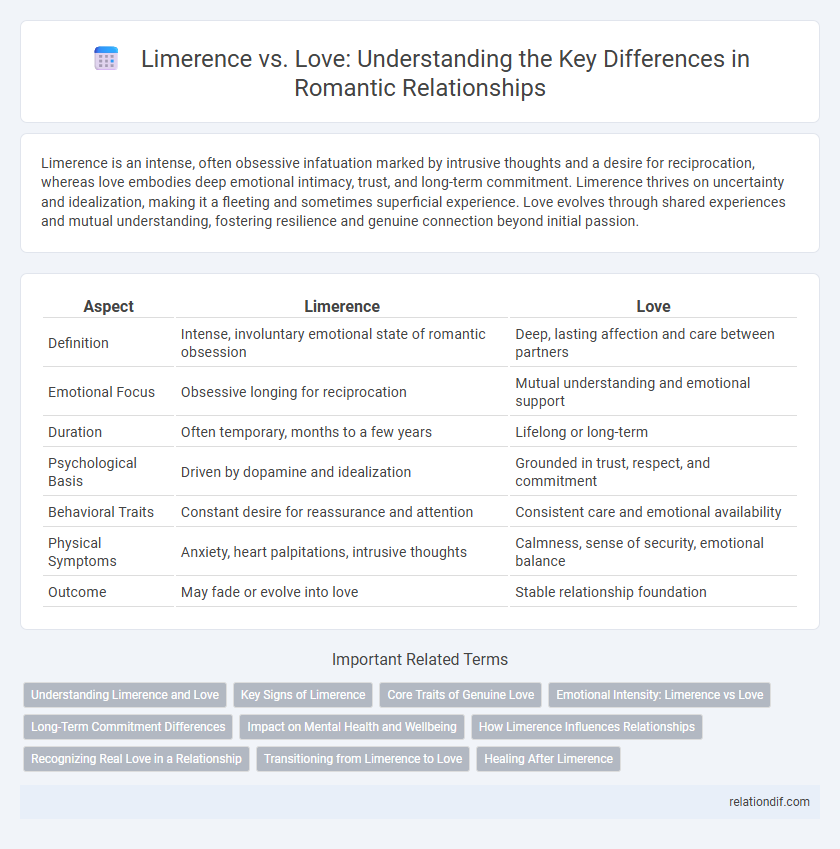Limerence is an intense, often obsessive infatuation marked by intrusive thoughts and a desire for reciprocation, whereas love embodies deep emotional intimacy, trust, and long-term commitment. Limerence thrives on uncertainty and idealization, making it a fleeting and sometimes superficial experience. Love evolves through shared experiences and mutual understanding, fostering resilience and genuine connection beyond initial passion.
Table of Comparison
| Aspect | Limerence | Love |
|---|---|---|
| Definition | Intense, involuntary emotional state of romantic obsession | Deep, lasting affection and care between partners |
| Emotional Focus | Obsessive longing for reciprocation | Mutual understanding and emotional support |
| Duration | Often temporary, months to a few years | Lifelong or long-term |
| Psychological Basis | Driven by dopamine and idealization | Grounded in trust, respect, and commitment |
| Behavioral Traits | Constant desire for reassurance and attention | Consistent care and emotional availability |
| Physical Symptoms | Anxiety, heart palpitations, intrusive thoughts | Calmness, sense of security, emotional balance |
| Outcome | May fade or evolve into love | Stable relationship foundation |
Understanding Limerence and Love
Limerence is characterized by intense, obsessive attraction and a craving for emotional reciprocation, often marked by idealization and uncertainty. Love encompasses deep, enduring affection, commitment, and a mature understanding of a partner's strengths and flaws. Differentiating limerence from love involves recognizing limerence's temporary infatuation and dependency versus love's stable, reciprocal bond.
Key Signs of Limerence
Key signs of limerence include obsessive thoughts about the person, intense longing for reciprocation, and emotional dependence on their responses. Physical symptoms such as butterflies, heart palpitations, and anxiety often accompany these mental fixations. Unlike stable love, limerence is characterized by uncertainty and idealization that can lead to emotional volatility.
Core Traits of Genuine Love
Genuine love is characterized by selflessness, unconditional acceptance, and deep emotional intimacy, contrasting with limerence's intense, often obsessive infatuation that centers on idealization and desire for reciprocation. While limerence involves volatile emotions and anxious longing, genuine love fosters stability, mutual respect, and a commitment to the partner's well-being beyond superficial attraction. Core traits of authentic love include empathy, trust, and enduring connection, which support long-term relational growth and emotional security.
Emotional Intensity: Limerence vs Love
Limerence is characterized by intense emotional highs and obsessive thoughts, driven by fear of rejection and desire for reciprocation, creating a rollercoaster of anxiety and euphoria. Love presents a deeper emotional stability, marked by trust, commitment, and a balanced connection that withstands challenges over time. Emotional intensity in limerence is often fleeting and idealized, whereas love cultivates enduring warmth and acceptance beyond initial infatuation.
Long-Term Commitment Differences
Limerence is characterized by intense infatuation, obsessive thoughts, and a desire for reciprocation that often fades over time, whereas love involves deep emotional connection, trust, and mutual respect that sustain long-term commitment. Long-term relationships rely on love's foundation of acceptance, shared values, and consistent support, contrasting with limerence's temporary and idealized attraction. Unlike limerence, love fosters resilience through challenges, enabling couples to build a lasting partnership.
Impact on Mental Health and Wellbeing
Limerence triggers intense emotional fluctuations characterized by obsessive thoughts and anxiety, often leading to stress and impaired mental health. In contrast, love fosters emotional stability, secure attachment, and long-term psychological wellbeing through mutual support and trust. Understanding the distinction between limerence and love is crucial for promoting healthy romantic relationships and maintaining overall mental health.
How Limerence Influences Relationships
Limerence, characterized by intense obsessive thoughts and idealization of a partner, can create unrealistic expectations that challenge the foundation of a stable romantic relationship. This state often prioritizes emotional highs and validation over genuine connection and long-term compatibility, leading to potential misunderstandings or disappointment. Recognizing the difference between limerence and mature love enables individuals to foster healthier relationships based on trust, respect, and mutual growth.
Recognizing Real Love in a Relationship
Recognizing real love in a relationship involves distinguishing it from limerence, which is characterized by intense infatuation and obsessive thoughts. Real love grows steadily with mutual respect, deep emotional connection, and a commitment to support each other's well-being beyond initial attraction. Signs of true love include consistent trust, effective communication, and shared life values that foster long-term partnership stability.
Transitioning from Limerence to Love
Transitioning from limerence to love involves shifting from intense infatuation to a deeper emotional connection characterized by trust, commitment, and mutual understanding. While limerence is marked by obsessive thoughts and idealization, love embraces acceptance of imperfections and fosters long-term bonding. Developing emotional intimacy and vulnerability plays a crucial role in transforming fleeting passion into enduring love.
Healing After Limerence
Healing after limerence involves recognizing the intense emotional obsession as distinct from enduring love, allowing individuals to regain emotional balance. By fostering self-awareness and practicing self-compassion, people can rebuild trust in their own feelings and develop healthier romantic boundaries. This process supports the transition from infatuation-driven attachment to mature, stable love founded on mutual respect and genuine connection.
Limerence vs Love Infographic

 relationdif.com
relationdif.com